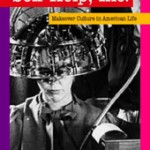 Currently I’m (very slowly) reading Micki McGee’s Self-Help, inc. While I am a little disappointed by the lack of serious attention to race in relation to labor and being belabored, I find her book to be a useful introduction to the rise of self-help culture in post Industrial U.S. It’s fascinating to read the larger history of books that I used to see as kid on my dad’s bookshelves (or that he told me about in our many conversations); books like Robert Schuller’s Tough Times Never Last, But Tough People Do. Schuller was a favorite of my dad’s. I remember him watching Schuller’s Hour of Power, direct from the Crystal Cathedral in California. Ah, the memories!
Currently I’m (very slowly) reading Micki McGee’s Self-Help, inc. While I am a little disappointed by the lack of serious attention to race in relation to labor and being belabored, I find her book to be a useful introduction to the rise of self-help culture in post Industrial U.S. It’s fascinating to read the larger history of books that I used to see as kid on my dad’s bookshelves (or that he told me about in our many conversations); books like Robert Schuller’s Tough Times Never Last, But Tough People Do. Schuller was a favorite of my dad’s. I remember him watching Schuller’s Hour of Power, direct from the Crystal Cathedral in California. Ah, the memories!
 In the chapter I’m reading right now, McGee is tracing the differences between Stephen Covey and Tony Robbins. While they have contrasting relationships to religion, ethics, values, both Covey and Robbins use them for achieving success in business. Robbins draws upon the tradition of televangelists, developing a system that focuses on personality and mind-power. Covey looks to Ben Franklin (his
In the chapter I’m reading right now, McGee is tracing the differences between Stephen Covey and Tony Robbins. While they have contrasting relationships to religion, ethics, values, both Covey and Robbins use them for achieving success in business. Robbins draws upon the tradition of televangelists, developing a system that focuses on personality and mind-power. Covey looks to Ben Franklin (his  company is Franklin Covey after all) to develop a rational system based on improving the quality of one’s character. As I remember it, my dad was definitely more of a fan of the Covey approach. Does he have any Tony Robbins books? I don’t know, but I’m sure that he has Covey’s book and that in the 80s/90s, he spent a lot of time and money in Franklin planner stores. Did he still use them in 1997, when the Franklin planner became the Franklin Covey planner?
company is Franklin Covey after all) to develop a rational system based on improving the quality of one’s character. As I remember it, my dad was definitely more of a fan of the Covey approach. Does he have any Tony Robbins books? I don’t know, but I’m sure that he has Covey’s book and that in the 80s/90s, he spent a lot of time and money in Franklin planner stores. Did he still use them in 1997, when the Franklin planner became the Franklin Covey planner?
Here is a passages that might be useful as I think through the relationship between self-help literature, virtue ethics and Foucault:
Rather than suggesting, as does Stephen Covey, that self-control should govern the self through the ascendance of mind over body (exercising “character,” or, in Covey’s metaphor for early rising,” mind over mattress”), Robbins imagines each of us as the disc-jockeys and film directors of our own lives, programming, rather than suppressing, our impulses. In this sense, Robbins leaves behind the Enlightenment notion of the reasonable creature and moves in the direction of a Nietzschean model of “giving style to one’s life” (McGee 62).
Earlier in the chapter, McGee spends some time discussing how self-help culture involves a turn from the spiritual to the therapeutic and aesthetic and a focus on treating the self as a work of art. I’m interested in thinking through how to read Foucault’s care of self and self-as-stylized against, beside and through this notion.

Comments are closed.